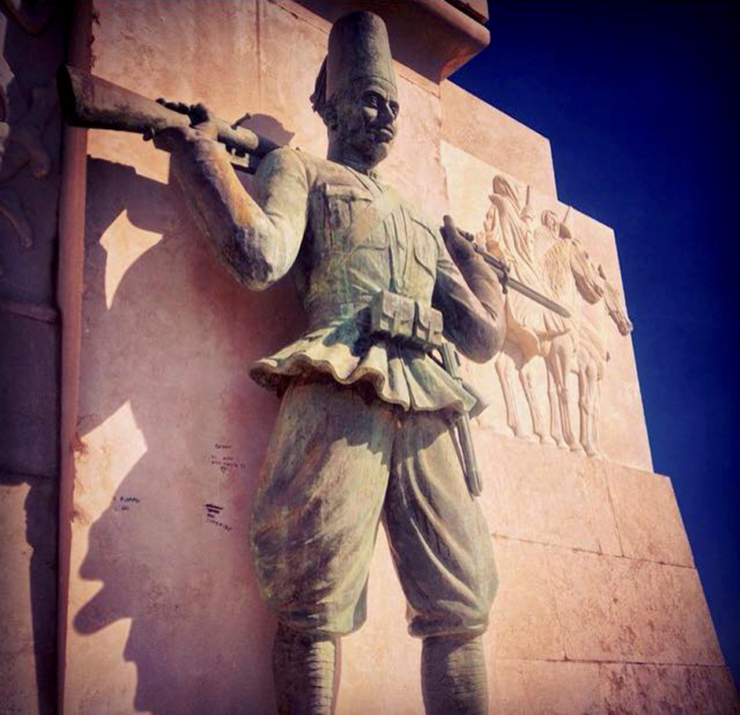Agenda
Roundtable on Italian Fascist and Colonial Heritage: Past and Present
Speakers: Dr. Roberta Biasillo – Utrecht University (uu.nl) (Assistant Professor in contemporary political history, Dept of History and Art History); Dr. Maria Bonaria Urban (Director of Studies in History at the KNIR; Senior lecturer in Italian Studies, University of Amsterdam)
Respondents: Dr. Britta Schilling (Associate Professor, Dept of History and Art History, Cultural History); Dr. Susanne Knittel (Associate Professor of Comparative Literature, Dept of Languages, Literature and Communication)
Organizers: Dr. Michela Borzaga (Assistant Professor of Comparative Literature, Dept of Languages, Literature and Communication), and Monica Jansen (Assistant Professor of Italian Studies, Dept of Languages, Literature and Communication)
This roundtable will focus on topics related to Italy’s colonial heritage during Fascism and ask questions on how to deal with this difficult cultural heritage in the present. After an introduction by Michela Borzaga and Monica Jansen on some theoretical concepts and ethical issues that were raised after a memorial was opened to fascist commander Field Marshal Rodolfo Graziani, Roberta Biasillo and Maria Bonaria Urban will give presentations on the topics below. After a brief conversation with the respondents, the discussion will be opened to the audience.

Roberta Biasillo: A monument to whom? Making fascist colonialism acceptable in Republican times
In May 1940, one month before Italy entered the war, sculptor Romano Romanelli delivered marble slabs and friezes to the Ministry of Italian Africa for a monument to be erected in Addis Ababa (the capital of the Italian empire). WW2 made transportation by sea impossible and about 284,000 kgs of marble and bronze remained in Italy, stored in private warehouses at the expense of the State. In 1963 the monument was erected in Siracusa (Sicily) with slight adjustments. This presentation reconstructs the story of this piece of public art from its commission to its significance today, and analyses the memories of Italian colonialism in Africa produced by the fascist and republican regimes between 1938 and 1963.
Maria Bonaria Urban: Dealing with missionary and colonial collections in Italy today
In recent years, ethnographic collections have been the subject of heated debate. Such a debate has also affected the major ethnographic museums in Italy, both public and religious. While research has mainly highlighted the problematic nature of such collections, more attention needs to be paid to the transformations they are currently undergoing. Drawing on unpublished sources and on first-hand observation of current exhibitions, in my talk I will discuss in particular how some Catholic mission museums, the Vatican’s Anima Mundi Museum and the Museo delle Civiltà in Rome are dealing with their collections and what the implications are.

Source: Vatican
Speaker Bios:
Roberta Biasillo is assistant professor in contemporary political history at the Department of History and Art History. She earned a PhD in Modern European History at the University of Bari (Italy) and she has been a postdoctoral researcher in several European institutions. Her research interests lie at the confluence of environmental history and political history. She has focused on how marginal environments embedded in Italian nineteenth century liberalism and on the role of African colonial environments in shaping Italian fascist state and empire. She is currently working on a research project on the global environmental history of Modern Libya. Together with M. Armiero and W. Graf von Hardenberg, she is the author of Mussolini’s Nature: An Environmental History of Italian Fascism (MIT Press, 2022).
Trained in Literary Studies and History in Italy, Maria Bonaria Urban is Senior lecturer (UD1) in Italian Studies at the University of Amsterdam since 2014 and currently Director of Studies in History at the KNIR in Rome. Her research interests include the history and legacy of (anti-)fascism, (post)colonialism, heritage and memory studies. At the moment she is co-editing a volume for Routledge on transnational fascism and populism in Europe and Latin America (together with Reindert Dhondt and Monica Jansen). Moreover, she has started a new research project on the role of the Vatican and Catholic missions in the former Fascist colonies in East Africa between 1941-1958.

